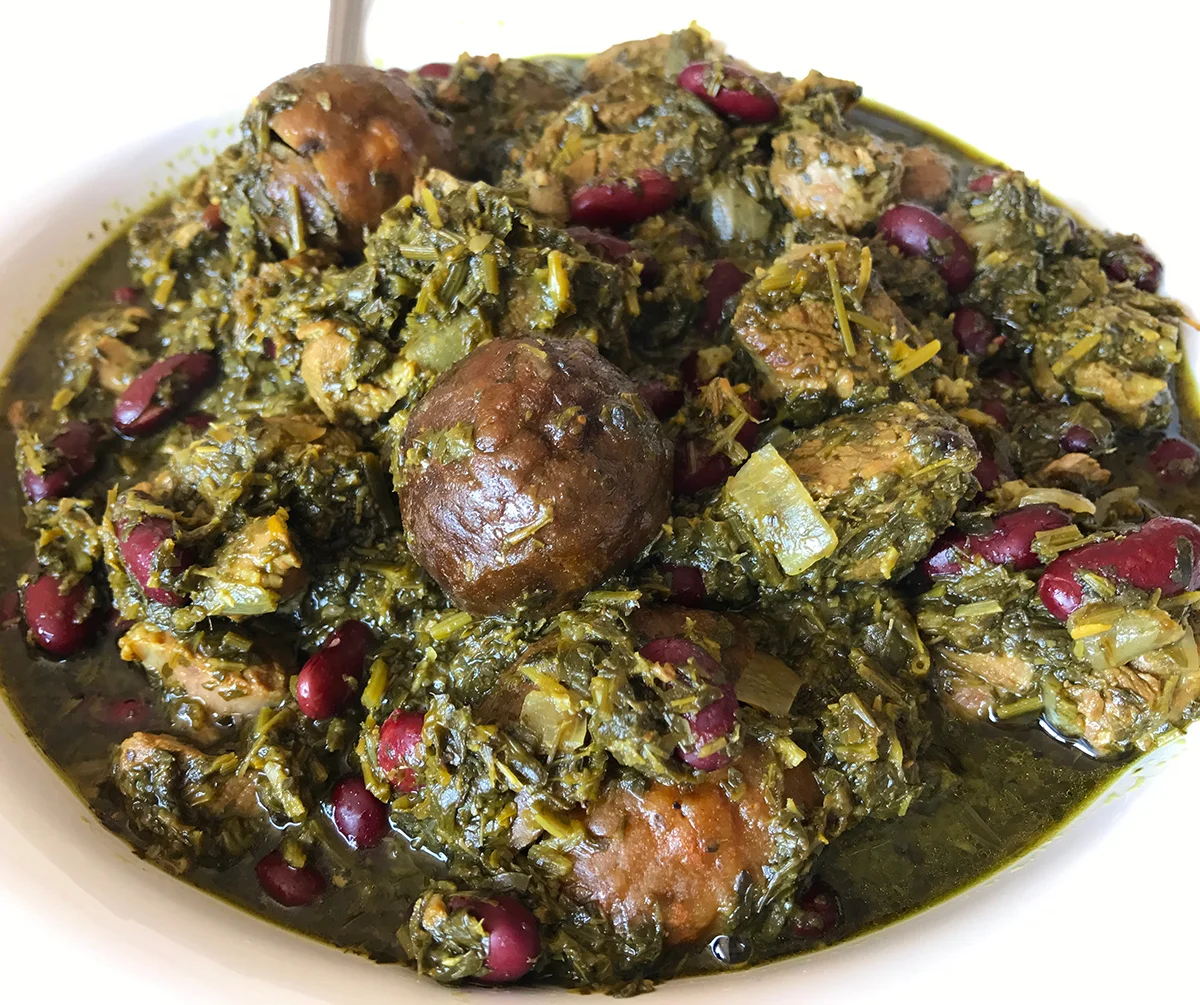(Serves 6-8)
Ghormeh Sazbi is the holy grail of Persian cuisine. It is the one stew I have greatly resisted sharing a recipe for as immediately it will attract hoards of argumentative Iranians who tend to jump all over you with how the recipe “should be”. The plain truth of the matter is that there is no ONE version and every household in Iran has a slightly different recipe. Depending on which part of Iran you are from, you will usually use either red kidney beans, brown beans or black eyed beans and then to add more confusion to the matter, some people add spinach and some people swear (rather angrily) that this should never be done. Some people insist on using chives and others don’t and then there is the whole debate about which kind of herbs to use… some use dried, some use fresh, some use frozen and so you see? There is no finite answer and I, much like Switzerland, prefer to remain neutral and to appease the Iranian Mafia out there, shall just say that this is my version for the Farangis and you know what? It tastes damn good considering nobody cooked in my house and I had to teach myself and furthermore, it took well over a decade to perfect… So peace and love everyone, lets make Ghormeh Sabzi, not war!
For my non-Iranian readership, this is truly a special stew with flavours that you will find intriguing and unlike anything you will have tasted before. If you have ever order anything from an Indian takeaway that has the word ‘Methi’ in it, then this is the very same fenugreek leaf used and it is divine. Best place to get it is either from an Asian or Persian supermarket or online. Buy lots because it keeps for a long time and our regular supermarkets haven’t yet cottoned on to its herby potential.
Ingredients
1kg lamb neck fillets, sliced width-ways into ¾ inch chunks
1 tablespoon of ground turmeric
2 large onions, roughly chopped
100g coriander, finely chopped, stalks and all
100g flat leaf parsley, finely chopped, stalks and all
2 big, generous handfuls of dried fenugreek leaf (not seed/powder)
4-5 dried limes (or 6-7 preserved lemons, halved, pips removed)
2 x 400g tins of kidney beans, drained and rinsed in a sieve
Salt and pepper
Oil for frying
Boiling water
Method
Preheat a large saucepan over a medium heat, drizzle in a generous amount of oil and fry the onion until softened. Add the lamb and seal it, then add the turmeric, season well with pepper and stir well. Add the dried fenugreek leaves and coat the lamb well in it, adding a little more oil if needed. Next, add the fresh herbs and stir fry them until completely wilted so they have turned from a bright vibrant green to a dark and thoroughly wilted almost-forest green, although without letting them burn. It is so important to wilt the herbs down properly as this is what will enable the sauce of the stew to have the right consistency, so ignore everything you know about keeping things green and vibrant, this is the Middle East and we do things differently.
Then, season the whole stew generously with Maldon sea salt (you should check seasoning again about an hour into cooking time) and then prick the dried limes and add them to the pan (if using preserved lemons, add them in just 30 minutes before you serve) and cover the contents with just enough boiling water to barely cover the meat and reduce heat to a low-medium heat and cook for 2 hours, stirring occasionally. I like to check in on the stew after 20 minutes to ensure its not on too high a heat, before leaving it for the remaining cooking time. Do not be tempted to add more water, a slightly thicker herb sauce is what you want to achieve. If your sauce looks like its drying out, reduce the heat (especially if using gas) but also remember that placing a lid on top of the pan will ensure you preserve/increase liquid volume inside the pan.
Once done, gently squeeze the softened limes using a wooden spoon to allow for some of their sour juice to acidulate the stew (Iranians would squeeze extra lemon juice into the stew), stir and then add the kidney beans, stir and cook for another 30 minutes or so and serve with Persian-method basmati rice, for which there is an authentic recipe in my first book Persiana.
The stew will freeze well so IF there are any leftovers, you can do so and keep it for up to 3 months in the freezer, as well as any leftover rice. Freezing rice is fine and I’m not sure where all these myths about not freezing rice, come from.

